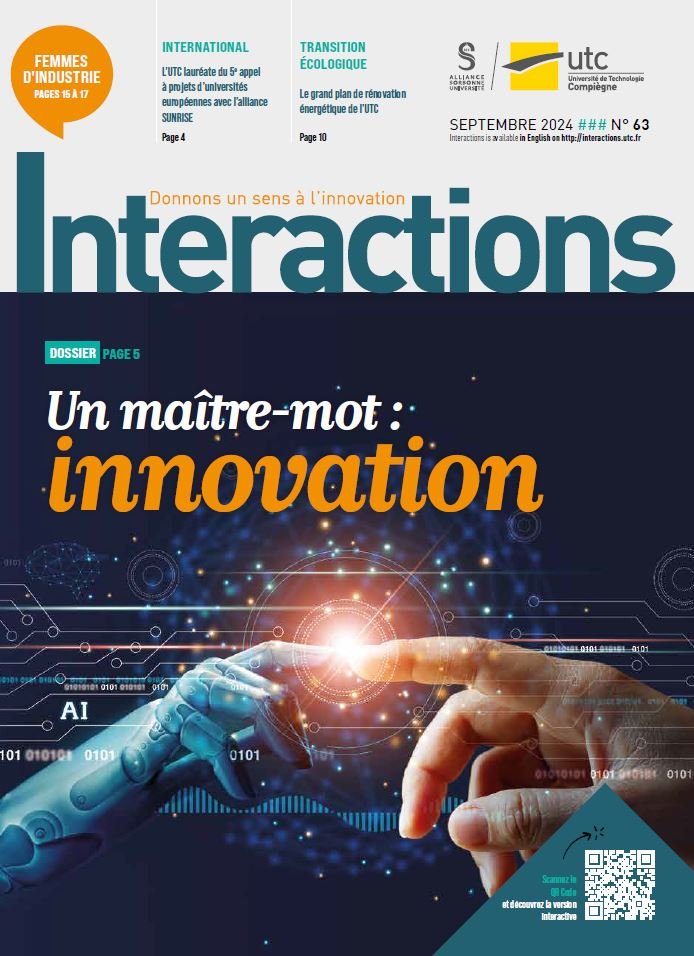Changing the world by changing the way we look at innovation

The partnership Foundation and Founding members Group Saint Gobain and Sopra Steria are working hand in hand with UTC to support scientific excellence, in particular via the «Social Awareness and Innovation» Chair. The aim is twofold: to broaden social awareness within UTC, but also to have an impact on technological innovation within the Region’s industries.
In the French academic landscape, UTC occupies a prime position in terms of technological innovation. UTC’s slogan is to «lending meaning to innovation», invites reflection on the conception, design and future of technology. The question of the social composition of the groups involved in these innovations all too often remains a blind spot in innovation-oriented studies in France. The «Social Awareness and Innovation» Chair proposes to focus particularly on this issue and to experiment with concrete actions. In scientific terms, the Chair headed by Michaël Vicente, lecturer in sociology at UTC, with other members of UTC’s Costech laboratory. Alexandre Longa, a research engineer, has been recruited to coordinate the Chair’s work. «We have ongoing activities with platforms such as UTC’s digital hall and the fab lab. The players also include institutions. We are already working with around ten secondary schools, and other collaborations are being developed throughout the Hauts-de-France Region and in the Seine-et- Marne Department. The financial backers, viz, the Hauts-de-France Region, the bank Crédit Agricole Brie Picardie Foundation and the UTC Foundation for Innovation, are also involved in these initiatives,» explains Michaël Vicente. The aim of this Chair is to develop a series of researchaction projects on the role of social awareness in innovation contexts. The aim is to highlight and describe the mechanisms that link social awareness and innovation, in their historical, statistical and experimental dimensions. The aim is to develop this type of research and make it visible internationally.
An impact on the social diversity of students
This Chair will be based on three pillars: awareness-raising, support and action research. This type of project will require the introduction of awareness-raising measures in secondary schools, which could be coordinated with the work carried out by the «cordées de la réussite». This could be done by mobilising students or former students to work in local establishments. The five-year objective is to have a real impact on the social diversity of students. «The support dimension will involve either the introduction of specific modules or a reinforced tutoring programme and will be aimed at more specific and voluntary monitoring of the new cohorts integrated: monitoring of the fundamentals (Mathematics, Physics), but also mastery of the French language and writing. All of these actions will be in support of and in line with existing actions within UTC. From a pedagogical point of view, the aim is to put technology at the heart of the educational system,» he adds.
Thinking about the plurality of possibilities in innovation processes
Here, innovation is seen as a factor in the economic and social development of a given Region. Some economists estimate that an increase of between 1 and 1.55% of GDP in annual growth could be achieved if innovation professions were made more widely accessible (Jaravel, 2023). «The aim of this Chair is to understand the obstacles to this democratisation and to propose ways of encouraging it. The aim of the project is to develop workshops to encourage people to become engineers, particularly those from disadvantaged backgrounds, rural areas or women. Our ambition is first and foremost to understand. It’s about understanding why disadvantaged people don’t apply, or don’t apply very much, for admission to our schools and to UTC in particular. The longer-term ambition is to ensure that there is greater social diversity at UTC, even though we know that this is a longterm task. That’s one of the reasons why we’re involved from secondary school onwards. After all, a vocation and ambition for education are forged quite early on in life.




